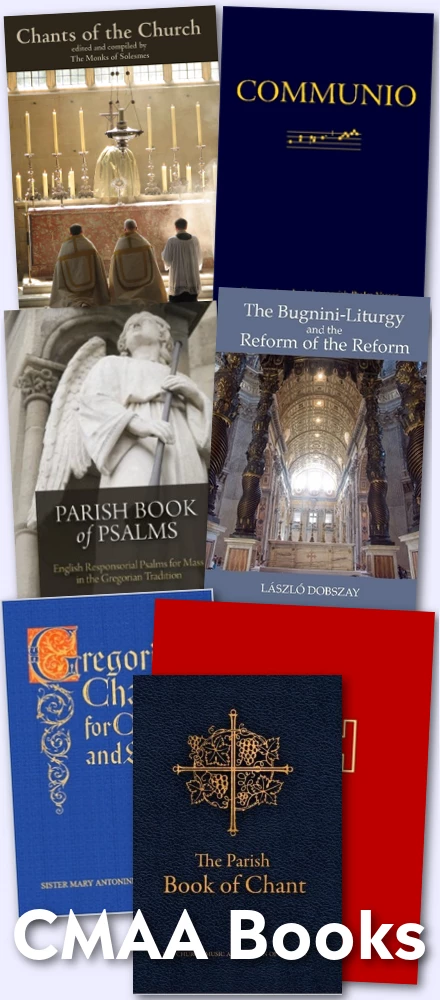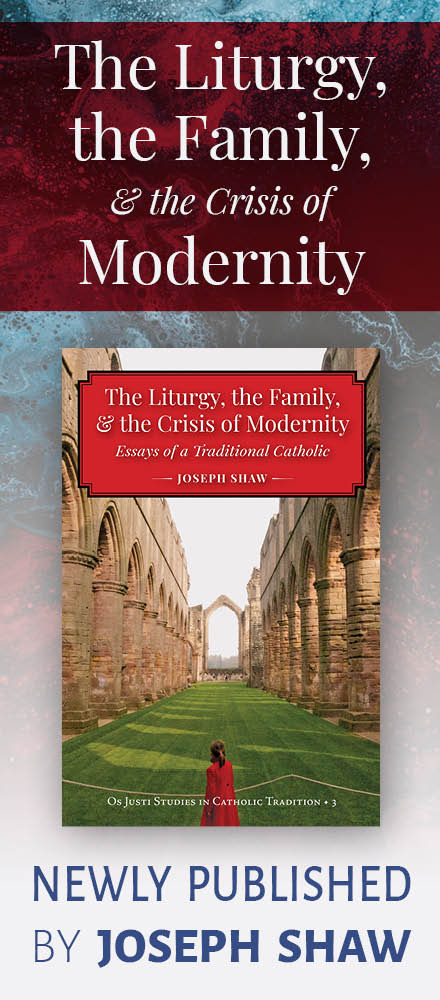Dear Rome,
I'm writing to ask you for some guidance. I direct music at my parish - and hope one day to be lucky enough to be in a parish that celebrates the Mass in both of its forms (thank goodness for Summorum Pontificum). But you may not fully realize how hard my job is right now. Let me explain:
From a musician's point of view, putting together music for the EF is easy. Open the Liber and there you go. The most difficult thing to decide is a Mass setting, and sometimes, in the case of a Requiem Mass or a Mass for Sunday during Lent, even that choice is narrowed down for you. All of the music for the EF is prescribed. If you have a competent schola you can pull it off. If you have extra time you can sing a motet after communion. You are ready to sing the Mass and go home, have a nice meal and glass of wine, and enjoy the rest of your day.
The ordinary form, on the other hand, is a different animal. It exists in a world riddled with mitigating circumstances. There are too many choices. If you've got the ideal in mind (Gregorian ordinary and propers, and maybe a motet or two), your troubles are just beginning. In some cases, ignorance (which I am not recommending here) can be bliss. But I digress.
The EF works because all music and action is integrated. Different theaters act independently but overlap in the most beautiful way. The final product is a jewel whose facets glimmer and shine in different ways, and at different times on different days.
But the OF is linear. Flow is important. One piece of music complementing another is also important. If you want a nice product that is accessible to parishioners (I assume that is why we are using the vernacular in most cases) and taps in to the eternal, an over arching view of the whole, keeping in mind all of the tiny parts, is essential.
Let me give you an example that might help illustrate the dilemma: If I were a chef and owned my own restaurant, I would have the choice of what to put on the menu. I would know that I need some lunch offerings and dinner offerings. I would have lower-end lunches that were quick and delicious, and I would also offer more elegant fare for those business men and women who have more change in their pockets, or retirees with time to spare. Dinner would be similarly varied. I might offer a few chicken and vegan dishes - all artfully prepared of course, but with my customers' budgets in mind. I would probably also offer a filet and a series of imaginative specials that occur to me on any given day. Prices on these would vary. In the end I would hope that my restaurant would serve me - satisfy my creative urges and be a financial success, and the community - provide diners with an alternative enticing and palatable enough to draw them away from their own kitchens on a recurring basis.
(Thanks for your patience. Now I'll talk about music at Mass again). If I am responsible for the music at an OF Mass, there are lots of things to take into consideration. Is it just a regular Sunday in Ordinary Time (think of this as a good dinner in my restaurant, not too fancy and affordable by all). I now have to make choices. I know what the ideal is, but my clientele, pardon me, my pastor and congregation, are not yet ready for all Gregorian chant. I don't want to alienate them or lose my job. I want to provide them with something in keeping with the norms of the Church yet worthy of the occasion.
Do I chose a dignified hymn to start things off? Now I know I should chose a proper. That has always been the norm, even though we got away from it for a while. It's coming back, thank goodness. I suppose you know about this address given by Msgr. Wadsworth of ICEL at a conference in Atlanta just last week.
But back to the matter at hand. Because I won't be doing all Latin quite yet (Here are where the mitigating circumstances I mentioned earlier come into play - parishioners and pastor not ready, missing schola members this coming Sunday, half of whom can't read chant, and I won't even tell you about the guitar problem I inherited when I took this job), do I chose a proper text in English set to a simple melody that all can sing? (We won't discuss here WHOSE job it is to sing the entrance, or Introit. I'll deal with that in another letter.) If so, which one? There are quite a few available these days. All free, too.
So once I decide on the Introit (I'm going to call it that on a consistent basis so those around me quit calling it the gathering song), what do I do about the ordinary of the Mass? We're working on some chant when we can, and I'd rather not introduce the old post Vatican II standby (Mass XVIII - deadly dull and for good reason). Maybe we should just skip the Kyrie and make sure everything that needed to be said was included in the Penitential rite. Whew! On to the Gloria. I think I will choose Gloria XV. The congregation is getting the hang of that. So is Father; it really rocks.
On to the Responsorial Psalm. (Wouldn't it be easy if I could just do the Gradual?) We just did Gloria XV, so I better lay off Latin for a while. Let me look and see what is posted for this Sunday at Jeff Ostrowski's Chabanel Psalm web site. I'll be sure to find something there that complements the Psalm tone Introit I chose and the chanted Gloria. I think I'll go with something in parts. I'll have 6 singers there this Sunday, and we can have two on each of the bottom parts. The soprano and alto are pretty strong, so we'll pull it off. The harmonic texture will be a nice change to the plainchant we've sung so far. And the English will be welcome.
I could go on, but I won't do it here. (In reality I will have to. Because I have to have this all figured out before rehearsal tonight AND in time to print up the programs for Saturday's vigil Mass.)
Does this give you an idea of the problems I am dealing with? The kinds of choices I have to face every week (and that's not taking into account weddings and funerals and other special days). Were that the OF as easy to put together as the EF.
Before I close, I do want to thank you for what you have done so far. Thank you for reviewing what was going on at Mass in parish after parish around the world and making the ideals clear and spelling out what those are (in the best way you could at the time): Gregorian Chant and Renaissance Polyphony.
But since the new translation of the Roman Missal was released last week, I thought this might be a good time for you to revisit some of the other things that have become fuzzy as a byproduct of your original revisions of the Mass. Since I am working in a parish that celebrates the ordinary form, with all of its mitigating circumstance, your firm guidance can't come soon enough.
Respectfully,
Your Servant
Music Director,
Anytown, USA
Friday, August 27, 2010
Musical Choices and Mitigating Circumstances: A Sincere Plea
AnonymousMore recent articles:
A Medieval Hymn for EastertideGregory DiPippo
Many medieval breviaries, including those of the Sarum Use, the Cistercians, Carmelites and Premonstratensians, have a hymn for the Easter season which is not found in the Roman Breviary, Chorus novae Jerusalem by St Fulbert, bishop of Chartres, who died in 1029. The original version of the Latin text, and the English translation of John Maso...
Two Upcoming Events from the Durandus InstituteGregory DiPippo
Our friend James Griffin of The Durandus Institute for Sacred Liturgy and Music wishes all our readers a joyous Easter season, by presenting two opportunities, at least for those in southeast Pennsylvania, to celebrate.First, this coming Sunday at 5pm, there will be a solemn Vespers in the traditional Latin rite for the Second Sunday after Easter a...
Letter to a Maximalist Music Director in a Minimalist WorldPeter Kwasniewski
Auguste Danse, Study of Three Singers (detail)The following is based on a real letter.Dear Friend,I’m sorry to hear that you’re experiencing some “ups and downs” with regard to the liturgy there, though it’s hardly surprising in a way. Your diocese is not well known for liturgical propriety or taste, and, beyond that, priests mostly have control ov...
The Tomb of St Peter Martyr in Milan’s Portinari ChapelGregory DiPippo
Here are some great photos from our Ambrosian correspondent Nicola de’ Grandi of the Portinari Chapel at the Basilica of St Eustorgio in Milan. They were taken during a special night-time opening made possible by a new lighting system; as one might well imagine, the Italians are extraordinarily good at this sort of thing, and more and more museum...
Recommended Art History and Artistic Practice Text Books for Homeschoolers... and Everyone Else Too!David Clayton
I want to recommend the Catholic Heritage Currricula texts books to all who are looking for materials for courses in art history, art theory and artistic practice at the middle-school or high-school level. These books present a curriculum that combines art history, art theory, and a theory of culture in a Catholic way. Furthermore, they provide the...
Launching “Theological Classics”: Newman on the Virgin Mary, St Vincent on Novelty & Heresy, Guardini on Sacred SignsPeter Kwasniewski
At a time of turmoil, nothing could be better or more important than rooting ourselves more deeply in the Catholic tradition. One of my favorite quotations is by St. Prosper of Aquitaine (390-455), writing in his own age of chaos: “Even if the wounds of this shattered world enmesh you, and the sea in turmoil bears you along in but one surviving shi...
Low Sunday 2025Gregory DiPippo
With his inquisitive right hand, Thomas searched out Thy life-bestowing side, O Christ God; for when Thou didst enter while the doors were shut, he cried out to Thee with the rest of the Apostles: Thou art my Lord and my God. (The Kontakion of St Thomas Sunday at Matins in the Byzantine Rite.)Who preserved the disciple’s hand unburnt when he drew n...
The Easter Sequence Laudes SalvatoriGregory DiPippo
The traditional sequence for Easter, Victimae Paschali laudes, is rightly regarded as one of the greatest gems of medieval liturgical poetry, such that it was even accepted by the Missal of the Roman Curia, which had only four sequences, a tradition which passed into the Missal of St Pius V. But of course, sequences as a liturgical genre were extre...
The Paschal Stichera of the Byzantine Rite in EnglishGregory DiPippo
One of the most magnificent features of the Byzantine Rite is a group of hymns known as the Paschal stichera. These are sung at Orthros and Vespers each day of Bright Week, as the Easter octave is called, and thenceforth on the Sundays of the Easter season, and on the Leave-taking of Easter, the day before the Ascension. As with all things Byzantin...
Medieval Vespers of EasterGregory DiPippo
In the Breviary of St Pius V, Vespers of Easter Sunday and the days within the octave present only one peculiarity, namely, that the Chapter and Hymn are replaced by the words of Psalm 117, “Haec dies quam fecit Dominus; exsultemus et laetemur in ea. – This is the day that the Lord has made; let us be glad and rejoice therein.” In the Office, this...




















